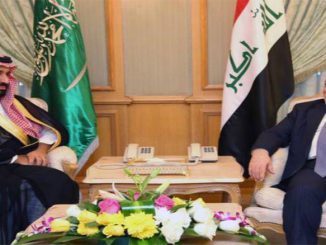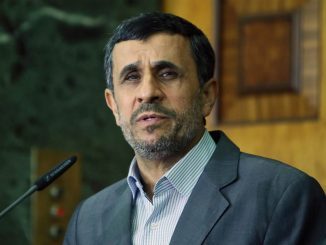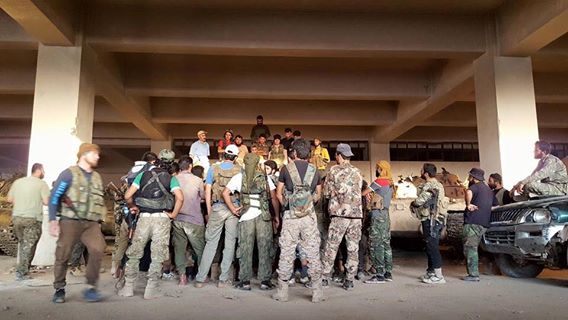
Iraq’s Prime Minister said that his country won’t take part in any regional or international conflicts, as he sought to repair ties with the US administration amid increasing tension between it and Iran.
“Iraq is very keen to preserve its national interests (..)and does not wish to be part of any regional or international conflict which would lead to disasters for the region and for Iraq,” Abadi said, according to state TV.
A political commentator close to Abadi, Ihsan al-Shammari, said Abadi’s comment addressed the U.S.-Iranian tensions.
“The Iraqi prime minister Dr. Abadi is stressing once again the policy of neutrality and to steer clear from conflicts,” political commentator Shammari told state TV.
Iran has close ties with the Shi’ite political elite ruling Iraq while Washington is providing critical military support to Iraqi forces battling Islamic State.
The comment came after Abadi had spoke in a phone call with U.S. President Donald Trump during which tensions with Iran were mentioned. The call was the first between the two leaders.
Trump initiated the call with Haider al-Abadi, which came amid public debate over the president’s executive order banning travel into the United States from a number of countries, including Iraq.
The White House said Trump used the call “to underscore the support of the United States for the Iraqi people in our shared fight against the terrorist group the Islamic State of Iraq and Syria (ISIS).”
“President Trump emphasized the buildup of the United States military,” the White House said. “President Trump also congratulated Iraqi forces on their recent progress in Mosul, thanked Prime Minister al-Abadi for his leadership, and expressed condolences for the many Iraqi lives lost in the counter-ISIS campaign.”
The White House added: “The two leaders discussed the strong partnership between the Iraqi and United States militaries, as well as the great sacrifice by both countries. Both leaders spoke to the threat Iran presents across the entire region. They also reaffirmed their commitment to the long-term partnership between the United States and Iraq grounded in the U.S.-Iraq Strategic Framework Agreement.”
Al-Abadi used this chance to ask Trump to lift the travel ban, according to the Iraqi government statement.
“Mr. Trump stressed the importance of coordination to find a solution to this issue as soon as possible and that he will direct the U.S. State Department in this regard,” the government said.
Abadi resisted calls from influential pro-Iranian Shi’ite politicians to retaliate against the ban when it was first announced by Trump at the end of January, citing Iraq’s need for U.S. military support in the war on Islamic State.
Trump told Abadi: “we will work together to defeat terrorism because Iraq is an ally of ours,” according to the Iraqi statement. “Dr. Abadi confirmed Iraq’s desire to strengthen relations with the U.S. at various levels,” the statement added.
However, Iraq’s request might not be fully answered as requested, as Trump is still fighting to implement his order or to at least to declare a modified version of it.
US-Iran tension
Barack Obama, The former US leader, was behind the historic Iran nuclear deal with P5+1 powers, agreed upon last year, which saw Tehran agree to amend its nuclear output in order to lift all nuclear-related economic sanctions, freeing up tens of billions of dollars in oil revenue and frozen assets.
After lifting the sanctions, Iranian president Hassan Rouhani visited Europe and made deals that worth billions of dollars. European companies started looking for investment opportunities in the growing Iranian market.
However, Trump’s election might change the whole game and threaten the development that was built in the past months.
Trump has said during his election campaign that the deal as “disastrous” and said it would be his “number one priority” to dismantle it.
These threats became clearer after Trump’s inauguration, as he signed an executive order temporarily barring thousands from seven countries in the Middle East and Africa, including Iran, from obtaining visas to travel to the United States.
In a clear challenge, a ballistic missile test was conducted by Iran on Sunday.
A U.S. defense official said that the missile test ended with a “failed” re-entry into the earth’s atmosphere, and later German sources said that the test included nuclear-capable missiles that are considered a breach of the nuclear deal.
After that Trump announced that “we’re officially putting Iran on notice”
A U.S. defense official said that the missile test ended with a “failed” re-entry into the earth’s atmosphere, and later German sources said that the test included nuclear-capable missiles that are considered a breach of the nuclear deal.
After that Trump announced that “we’re officially putting Iran on notice”, and declared new sanctions against Iran later.
Iran responded with military maneuvers, in which tested new missile and radar systems.
In addition, the Iranian took to the streets in the Iranian revolution day chanting against Trump and challenging him to put more sanctions against their country.



